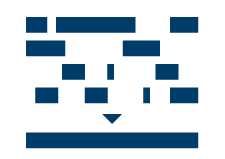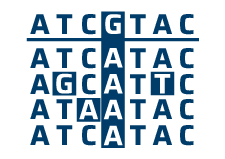Bioinformatics
SeqCenter was founded as an economic and expedient genomics sequencing service provider, but did you know that we also offer a variety of analytic services? Our skilled team of bioinformaticians address the most pressing needs of our customers, which are detailed on this page. These analytic services follow peer-reviewed industry standards and exclusively use open-source programs to ensure transparency and reproducibility.
Our goal is to provide meaningful data and preliminary analyses to help guide your experimental design. As with all bioinformatic analyses, these findings are considered predictive only and should be validated through empirical testing before proceeding to publication. To help you get started with the analysis of your sequencing data, we have curated a list of our most common basic analyses.

Assembly and Annotation
As the volume of generated sequence data continues to expand, the scientific community has a responsibility to ensure that the data accurately reflects the genomic information of the host organism. At SeqCenter, we utilize rigorously reviewed tools to carry out de novo genome assemblies to capture this information. This analysis is valid for our Illumina, Oxford Nanopore, and PacBio sequencing packages for homogeneous samples, with some options for metagenomic samples.

RNA Analysis
RNA expression data has the power to show us the active functions within a cell moments before the suspension and isolation of RNA. Differential expression analyses can identify actively expressed genes and can elucidate the active metabolic functions within an organism at the time of sampling by accurately mapping, counting, and comparing sequenced RNA transcripts against a valid reference genome. This analysis is valid for our Illumina RNA sequencing packages.

Haploid Variant Calling
Genomic changes at the cellular level can have a dramatic impact on the overall function and appearance of microbial communities and can provide evolutionary advantages. Mutations can be captured through whole genome sequencing and subsequent variant calling to identify SNPs, indels, and other mutations within monoclonal, haploid samples. For diploid or polyploid variant calling services, please contact us for custom analysis. This analysis is valid for our Illumina DNA sequencing packages and Oxford Nanopore WGS packages.

Custom Analysis
The needs and demands of the scientific community rapidly adapt to innovations in technology and literature. At SeqCenter, our goal is to make genomic data accessible. If there is a custom bioinformatic project you would like to discuss with us, please click Explore to learn more. This analysis is valid for our Illumina, Oxford Nanopore, and PacBio sequencing packages.

Contact:
91 43rd Street, Ste. 250
Pittsburgh, PA 15201
(878) 227-4915
Services:
About:
Resources:
